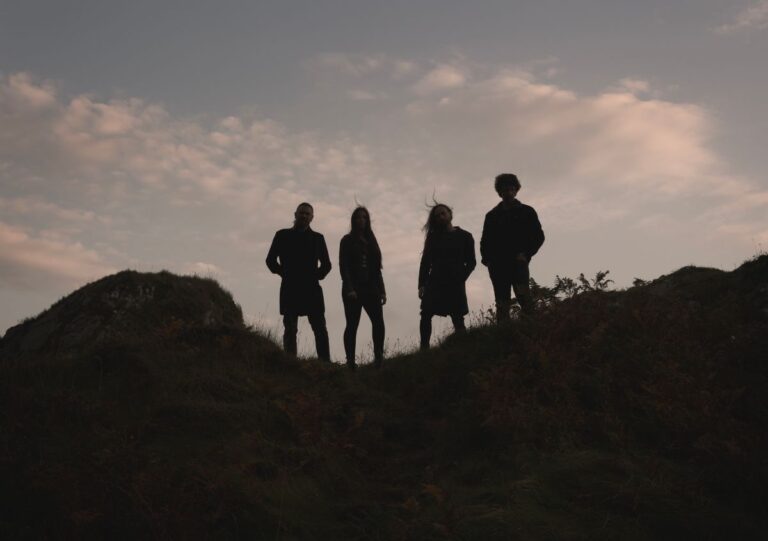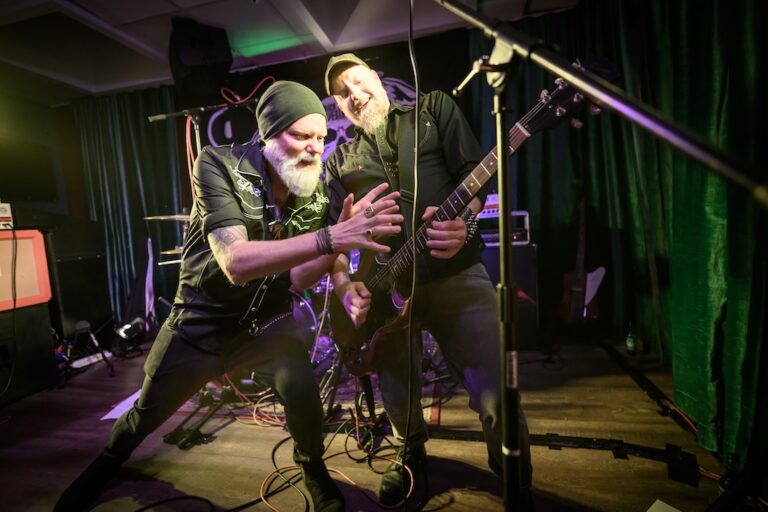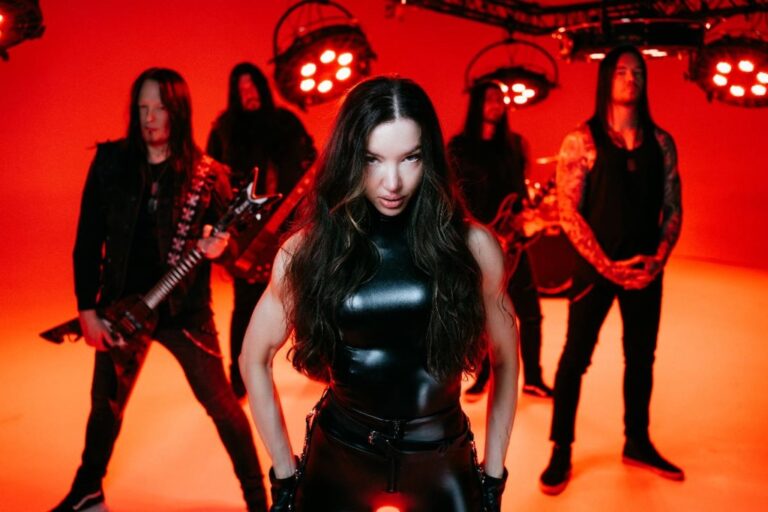It’s hard to believe, but Derrick Green has been the frontman of Sepultura for nearly twenty years. In that time the band has evolved considerably since its inception, drawing in progressive elements and experimenting with numerous different elements, most notably with the concept albums ‘Dante XXI’ and ‘A-Lex’ and with a percussive collaboration featuring Las Tambours du Bronx filmed live at Rock in Rio. It is, perhaps, inevitable that Derrick’s early years, in particular, were marred by those who still hopped for a reunion with the departed singer and guitarist, Max Cavalera, but for those who stayed with the band, oblivious to petty squabbles largely created by a soundbite-craving media, the rewards were a body of work that has proved to be sonically adventurous and continually dramatic.
Whilst the early albums of Derrick’s tenure with Sepultura were impressive, the band seem to have hit a new creative peak since the release of 2011’s ‘Kairos’ (the band’s first release with Nuclear Blast Records) and both ‘Karios’ and its immediate successor ‘the mediator between head and hands must be the heart’ were mature expressions of the band’s continued dedication to darkly intelligent and literate metal. Little in either album, however, prepared the listener for ‘Machine Messiah’, an album that will almost certainly stand as a career highlight for the band (check our review here). From the moment it opens with the darkly cinematic title track, awash with Derrick’s carefully layered vocal harmonies, it’s clear that ‘Machine Messiah’ is framed around a concept that has a deep emotional resonance for the band. Whilst the music still packs a fiery punch, the experimentation of the band, not least Eloy who truly comes into his own on the record, adds great depth to the music. We were lucky enough to secure a phone interview with Derrick in order to discuss the creation of the record and the themes that underpin the expressive lyrics within – read on and meet the Machine Messiah…
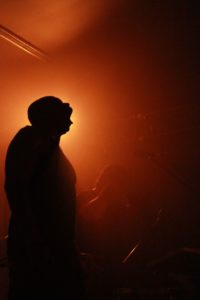
On stage you’re very much the frontman and your concentration is on the vocals, but I’ve noticed your name appears in the music writing credits for a lot of the songs, so I wanted to ask how you’ve been involved in shaping the sound of Sepultura as opposed to the lyrics?
OK, well a lot of times we have a pattern and a method of writing which has been pretty much the same since I joined the band and, I think, before I got in the band; but, this last album, we approached a little bit differently. Since we’re older and have a little bit more experience and time being in the studio and being around each other we became more comfortable doing things independently, outside of the studio. So with this album, Andreas would have numerous guitar riffs that he had written at home; Eloy would also have drum tracks from ideas that he had written at home and I would have, of course, a list of vocal ideas and lyrics. Andreas and Eloy would get together and, as far as impact, we’re all there: we’d go over a few ideas in the studio. Also, Andreas would send Eloy some ideas, Eloy doing the same with Andreas and I would hear both of them trying to develop ideas for vocal patterns. In practice we would go and put everything together, my ideas, the vocal ideas, where certain things should go and I would speak a lot with Andreas about forming it and where he was going (and where he had the idea of going) with the song and, in this way, we would really combine, I think, very well… very effectively… in the writing process for this last album. And so we would do this every day, coming in to the studio, coming with ideas and whatever would really stick with us, we’d keep, and everything else we would just throw out. And so this process would go on for weeks until we felt we had enough material.
One of the things that really draws me to a lot of the work that you’ve done with Sepultura is that there’s a really strong conceptual framework that you’ve built into albums like ‘Dante XXI’, ‘A-Lex’ and now ‘Machine messiah’ and I was wondering how far that conceptual element drove the development of the music?
It usually starts first, before the music is even there. It’s such an important aspect, I think, in the process of writing with Sepultura – to really have something to focus on and to drive us musically and mentally. I think with this it started the same way, with communication; with Andreas and myself speaking about our ideas of what’s been going on in the world around us and we’d had this conversation so many times about technology – about the plusses and the negatives of it and where the future is going and what we’re living in now – and I think just from that conversation and getting together and talking on the road and ideas, it developed into this concept for the album where Andreas had his ideas about technology and the future we’re in and me having my ideas as well. And they weren’t identical, but we were able to talk about them and see each other’s side and so we thought it would be a good idea to have an album with this debate that’s going on all around us and it really made for a great concept.
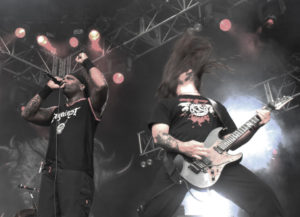
And the concept… looking through the lyrics for ‘Machine messiah’, it seems that you are very concerned about the increasing dislocation from each other that people seem to be undergoing in modern society…
I mean it’s pretty obvious – with technology there’s the advancement of humanity, there is the possibility of a stronger future, a future where people that are able to do better things. But, at the same time, people have to really look at what’s happening within themselves and get connected again with themselves. This disconnection with ourselves is the problem, I don’t think technology is really the problem. Technology is a part of us. It’s something that we invented, it’s a piece of us and so I feel that if we’re going to try to solve certain problems, we have to really take a look at ourselves which is not so easy to do, to admit our faults and move forward with that. But it’s something that’s really necessary before we move forward with a lot of technological advancement.
We can’t really move that much further when you have people who are uneducated, especially when they are uneducated about technology, because they become fearful. They become fearful and they want to destroy and ruin something. Throughout history it has always been that way, so I think it’s important that people… I feel there is a lot of negativity and negative things are out there, but, this idea that I have of reconnecting with ourselves and even, in a conservative way, of family values. I think a lot of those things are really missing that actually create strong individuals and strong people in their youth. This strong connection with family and that forming of a young human being is very important at the very early stages, so… there are a lot of things that we are really talking about lyrically on this album and there’s fear but there’s also, I feel, positivity. There’s a lot of change and people realising there needs to be a change.
There seems to be a slightly darker narrative that emerges in some of the tracks where you’re looking at the deliberate disconnection of people from themselves by… whether by government controlled teachers, corporations, false news or whatever – it’s that deliberate push to remove people from that notion of individuality – that seems to be a core theme as well.
Absolutely, I mean you see that a lot, especially in the United States. There are so many diversions that are happening around people that lead them away from themselves. From the reality of what’s really happening. Unfortunately that’s done through corporations and through media and this manipulation has been going on for such a long time. The US was founded by huge corporations to begin with: they were extremely rich people who wanted to establish some type of corporation without rules in the US and paying no taxes or not paying to a king or anything like that and really establishing whatever they wanted to do and I think it’s stuck in the tradition of US history as far as these companies being so manipulative, in politics especially, and how they’re getting away with manipulating the people. This is something that’s extremely unfortunate and it’s hard to break that cycle where people actually believe in it so much because that’s what they’re used to. They haven’t been outside of that box, so I think there are a lot of things that are able to break that cycle, but it really depends on the individual.
One of the things that Sepultura has always fought for, and heavy music in general I think, is the importance of individuality and I wonder if you still have that hope that music can connect with people on that primal level and, in some way, encourage people to find out for themselves rather than accept what they’re told?
Absolutely! I think we get a lot of response from fans and people in general and they’re happy with the example we’re setting and they’re able to find power within that. I think it’s a mutual thing as well, even outside of music, but I think that it’s great – the power that music does have when you’re writing things that you feel and that you truly believe and you’re very honest about. I think people can feel that, no matter what language or religion they are or what colour they are, I think music is able to break those barriers and that’s the beautiful thing about music that’s always been really special to me. And there are very few things that are like that, that are out there, that are so positive and so real and so truthful. I think that it will always have an impact on creating this energy within people to get motivated, it always has for me, listening to different styles of music and music in general my whole life, it has been such an inspirational tool in wanting to do better and to believe in change and hope.
One of the things I loved about the new album are the very interesting musical styles that appear –there are some middle-eastern strings and so on – I know Sepultura throughout its history has always explored world music themes, but it feels that this album goes even further down that path of exploration. How did you go about developing those themes in the album?
Well, like you said, I think it’s always been a part of Sepultura to really explore and I’m happy we’re able to have that ability to show in our music and not be blocked in or walled from doing that. So working with Jens Borgen in Sweden, he really came with a lot of great ideas and I think that that was a lot of the reason that he wanted to work with us as well – that we’re open to ideas and doing things differently and not being afraid of that.
He suggested that we had the Tunisian strings come in because he was feeling that vibe in the music, through the demos that he got and it was something that really came spontaneously, we had no idea to plan that, which made it even more special for us in the end result. Really we had no limitations in what we wanted to do, we just went with the flow and believed that Jens had ideas from hearing the music and believing that yes, it would fit very well with what we were doing. We liked the idea and once we heard it we thought it was perfect, it broadened the song and made it more interesting and actually, from travelling in these different areas of the world like Egypt, where we did a trip… we never even played there but the experience alone it saved us dealing with the politics of everything that’s going on there… It had a huge impact as far as the writing of some of the songs and I think that vibe was something that happened spontaneously, being able to connect with Jens and being in Sweden and just having really good timing and it really ended up flowing very well.
Musically the album seems to be very adventurous and it seems that Eloy has really come to the fore on this record, you’ve got that really interesting percussion at the start of ‘Phantom self’ – is he more involved in the creative side now that he’s onto his second record with the band?
Absolutely! That was something that I was really excited about as well. I knew from the first record that he would be fantastic but I had the feeling that on the second one he’d feel a lot more comfortable having done so many shows with us live and then the writing process… we took our time in the writing process and I think that added to having so many diverse and moving songs that are very different from each other. I think he felt so much more comfortable and being able to have such a diversity of songs, he was able to show his diversity as well. I’m really looking forward to playing these songs live, but I believe he was phenomenal in every way in the writing process. He had so much more involvement, I think he felt much freer, being in the band.
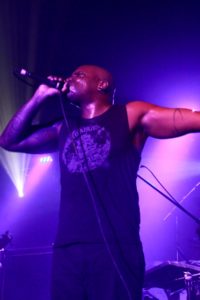
You mention this diversity in the music, and songs like the title track – it’s such an elegant and interesting opening… Was there a deliberate move to a slightly more progressive edge as we saw in ‘Dante XXI’?
I think that… Andreas and I were talking a lot about having some type of ballad-y type song, just because we never had that in the history of Sepultura and we were kind of laughing, years ago, about it, but Andreas really felt that we could do it and do something that wasn’t cheesy and that we really felt and that we could put it out in a way that other people could really understand it. So we kept working on it and we dropped it off certain albums and then it got to the point with this and he said that he felt he had something that would be really cool and once I heard it, I really fell in love with it because it was so heartfelt and so very real. And I knew that we had it within us to not hold back, you know the past that we had – Andreas studied classical music through University, it was one of the first things he did when he moved to the US. I studied classical music and I could sing; I was singing a lot before Sepultura, I just never really recorded anything, so I think that was one of the main reasons that actually got me in the band was the diversity I had with my voice and it was something they wanted to have in the future so that we could branch out if we wanted to. So, I think we really needed to show that and step up and show the ideas that we have and show our range musically and what each of us could do. I don’t think we wanted to back down from that, we wanted to feel proud about that and show that and it needed to go with this theme – this idea of people searching for messiah, this God, and they’re finding it in a cell phone or with technology. This is the new messiah. This is what people truly believe in and they feel that they’re suffering without it and that it secures everything for them – and so It’s sad in a way because people are losing that connection with themselves and with their soul and it’s a weird vibe and we really wanted to show that dramatically in the song and it was something that we’d never done before.
So once that song was written and everyone heard what I was going to sing on it, it just ended up being that it had to be the first song. It wasn’t intentionally going to be the first song, we were probably going to start with a super-heavy song which we normally do, but we felt we had room to do something different, to grab people’s attention and make them ask where the album was going to go. We really wanted to put that idea in people’s minds and that’s one of the things I loved about Alice in Chains – they had a song that was really ballad-y that they did a few albums back, I think when they first got the new singer, and I was so… it blew my mind that they would start with such a ballad-y song and it just really made me want to hear the album even more and so… we felt that ‘machine messiah’ had to be the first song on the album.
It’s funny you should mention Alice in Chains because one of the big parts of that song are the amazing harmonies on there – was that all you, just layering your voice in the studio?
Thank you, I really learned a lot about that with a side project I have called Maximum Hedrum. It’s a completely different style of music and with singing and there’s a lot of layering of vocals that I did with that, so I felt very confident in trying to do this with Sepultura, and it just seemed that we really needed that. It felt really natural and it felt really good and Jens was great at really pushing that. He really was very positive on the singing aspect and he felt that it could be done in a really amazing way and I’m very happy that we didn’t hold back from that.
Totally at the other end of the spectrum you concluded the deluxe edition of the album with a cover of the Ultra Seven theme – is that you singing in Japanese?
Yeah! It was kind of crazy! ([laughs] I don’t speak Japanese, so we had to have… we got in contact with the University in Orebro, where we recorded the album, in Sweden. It’s a small, small town, really in the middle of nowhere and there’s a great University that’s there and they have a lot of foreign students, so we got in contact with a Japanese student and he came to the studio and he was coaching me through the song to get the pronunciation of the words. And it was definitely one of the most difficult songs on the album to do… I think it probably was the most difficult.
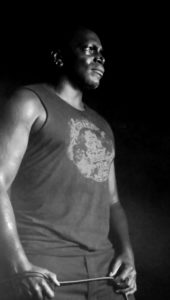
I was curious because I know that when you first joined Sepultura you learned Portuguese, so I wasn’t sure if you’d learned Japanese at some point, but it sounds amazing.
That’s great, it was a challenge, I have to say, and it was one of the best challenges I’ve ever had, and it will be to do it live. You know, only in Japan probably, but I think one day it’ll have to be done, so hopefully it’ll be like a singalong so I can go to the audience and sing along with them.
With regards to you playing live, there’s a lot of really interesting and complex instrumentation and I remember when you toured ‘Dante XXI’ you used playback for some of the songs, such as ‘Ostia’, so is that the route you’re considering for this tour, or will you be looking at recruiting extra musicians?
I think on this first tour we’re going to definitely do the same thing that we did with ‘Ostia’ – this backing track and that’s what we’ve been working on recently in practice. So we’re still ironing it out, but I believe that’s the route we’re going to go. It’s certainly sounding really good in practice and I want to see the reaction live and hear the sound live because that’s where the really true test is, so, yeah, we’ll see how that goes because I’m just as curious as you are! [laughs] We’re working on it, we’re getting ready to do this tour now, we’re practicing the songs with the backing tracks and it sounds very heavy.
I know you have a lot of interviews today, so it only really remains for me to say thank you very much for taking the time to speak to us today.
